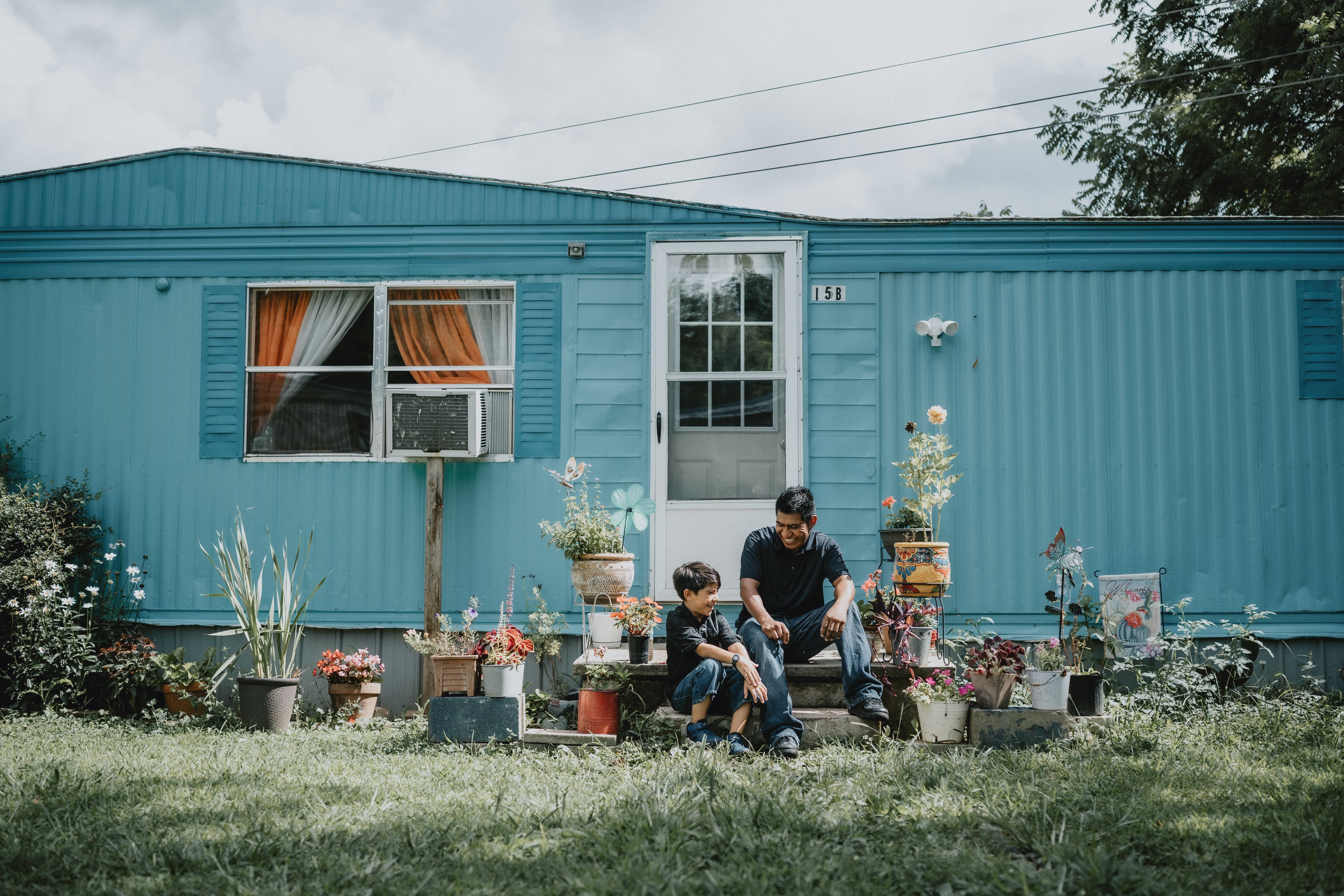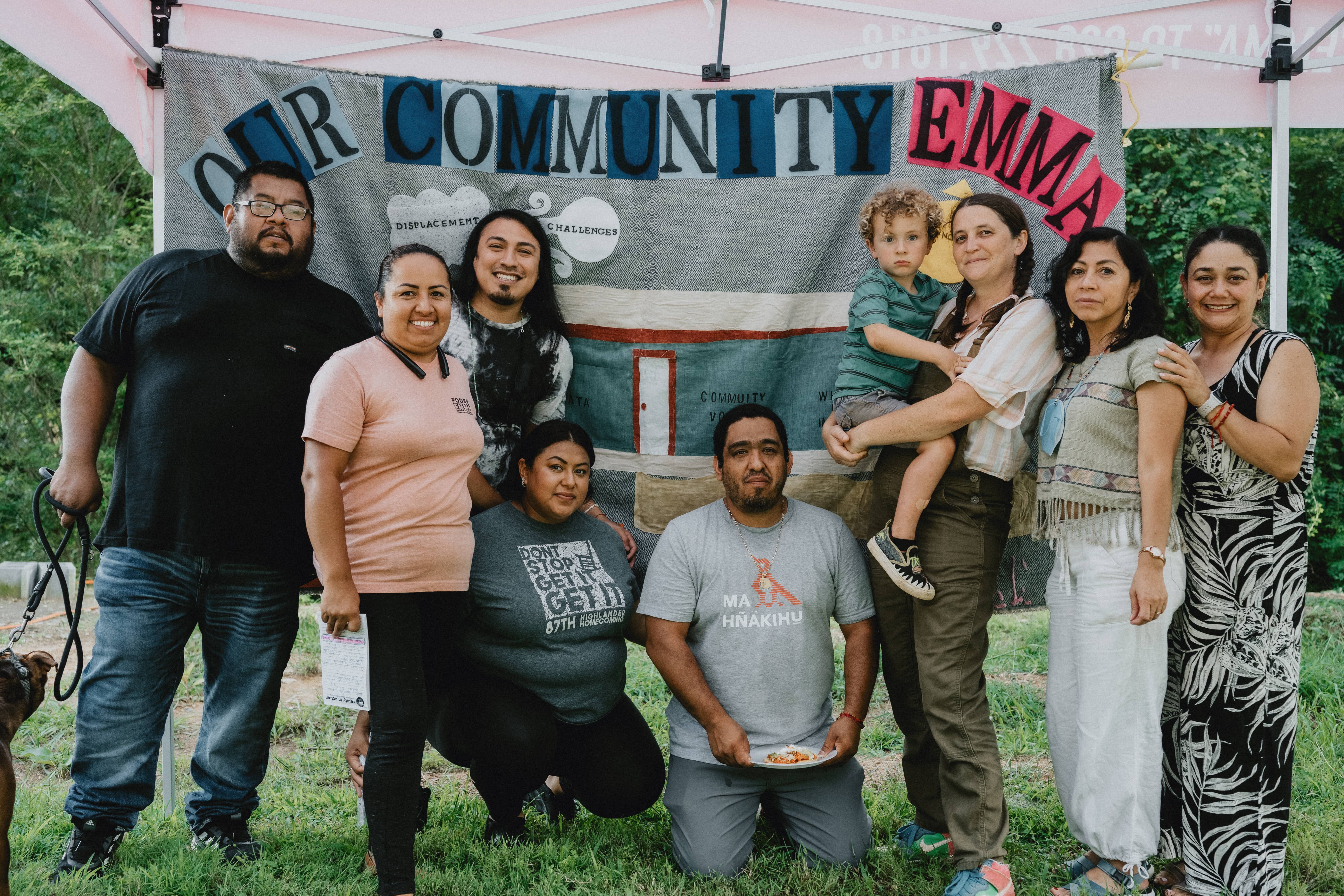
Development without Displacement
PODER Emma Community Ownership creates tools and strategies to prevent displacement and preserve the tight-knit nature of mobile home communities which keep families safe. PODER focuses on community-controlled economic development, local policy advocacy, and cultural work to protect the community they call home. We sat down with PODER leadership to learn more about their work and to get to know the vibrant, flourishing Emma community.
Hugging the intersection of Emma Road and North Louisiana Avenue, the cheerful yellow building that houses PODER Emma Community Ownership stands like a beacon. After over a decade of grassroots efforts focused on immigrant rights and cultural organizing by partner organizations CIMA and Raices, PODER was formally founded in 2017 as the community began to feel bolstered by the transformation that previous organizing efforts had achieved.
“Before…the work was really focused on ending driver’s license checkpoints and stopping racial profiling at checkpoints,” Andrea Golden, PODER Emma Co-Director, explains. “That was the biggest pain point our neighborhood was facing.” But gradually, as organizers were able to reduce the distress of checkpoints and ease the financial strain of repeated ticketing, it was a safer choice for families to remain in the neighborhood. That is, until the symptoms of gentrification began to rear their head, and PODER Emma recognized the writing on the wall.
Asheville’s development patterns would eventually put their neighborhood, particularly mobile home communities, in the crosshairs for displacement. Residents of mobile home parks in Emma watched as other mobile home neighborhoods across Buncombe County were demolished and replaced with high-priced condominiums and commercial properties, and PODER Emma made the decision to shift their focus.
By using a popular education model and listening to the community's experiences and knowledge, they began to take action, creating a comprehensive plan in 2018 by gathering 200 families together to learn from each other and come to a community agreement around the pressing question:
How could they rise to meet the risk of losing the spaces they called home, and perhaps also dispel the myth that mobile homes function as easily disposable, undignified housing?
“The community vision for PODER Emma is to try to stop or slow down the community displacement and gentrification,” said Rocio Alviter, PODER Emma Co-Director. “To be able to keep our community together, as we are a community targeted as an ‘opportunity zone,’ which makes us much more vulnerable as a community.”

Photos taken by Wild and Bright Photography.
Poder, the Spanish word for power, is an apt name for an organization comprising multiple community cooperatives, passionate organizers and advocates, a neighborhood council, youth programming and more–all working in service of keeping families in their homes and strengthening the arms of a community that holds each other safe.
Development without displacement is one of PODER Emma’s slogans, and in a rapidly growing city like Asheville, this is no small feat. According to the IRS, an opportunity zone is an economic development tool that allows people to invest in “distressed areas,” providing job creation and economic growth. One of the major selling points? Tax breaks for investors. Jean Ross, Senior Fellow of Economic Policy at American Progress, urges policymakers to take steps to reform the opportunity zone program, noting that this program “structurally favors high returns, not community benefits.”
“The idea is to protect mobile home parks as an affordable housing model. On many occasions, there are mobile home parks whose landlords are not even from the area, and they are for profit,” Alviter told us. “Our goal is for those mobile home parks to belong to residents and neighbors in the near future, not just a landlord but to have those mobile home parks as housing co-ops. That way, mobile home parks are protected as affordable housing, and the families that live in those parks can build equity.”
The Emma community rests just outside of downtown Asheville, off the bustling highway, Patton Avenue. The neighborhood’s name refers to Emma Station, a small train station built in the late 1800s named for Emma Clayton, the wife of a contractor for the Western North Carolina Railroad. Alongside Buncombe County in general, the construction of the railroad was responsible for the community’s growth. As Asheville grew in the aftermath of the Civil War, James Vester Miller, a black contractor and brick mason made his home in Emma and served as a community leader, becoming one of Asheville’s principal builders. Now, the community is home to entrepreneurs, essential small businesses, and cooperatives that contribute to the community’s health.

Photos taken by Wild and Bright Photography.
PODER Emma’s cooperative development work is centered around the belief that communities have the wisdom and experience needed to create powerful collective solutions to address the structural barriers they face, and that cooperative development is an important part of creating community power and equity. They steward Cooperative Networks of worker-owned cooperatives, housing cooperatives and real estate cooperatives for peer learning, shared resources, and collective economic power, providing technical assistance, accompaniment, and lending as a member of Seed Commons, a national community wealth cooperative. The loan fund has invested over $4,900,000 in community-owned cooperative assets in Emma.
As we stroll through Mahetsi and Sourwood neighborhoods–two of the resident-owned mobile home park cooperatives in the Emma community–the evidence of community care is palpable. Clad in overalls and a wide, easy-going smile, Ingrid Johnson, Co-Founder and Maintenance Coordinator for Chispas Property Management pauses at a resident’s home to help ensure that their scheduled maintenance goes smoothly. Older homes in need of care are being renovated. Roses line walkways. Lush gardens bloom in yards. A cozy front porch with colorful hammocks swinging underneath welcomes family and guests alike.
Alan Ramirez is on PODER’s Cooperative Development Team and a resident owner of the Sourwood Mobile Home Co-op. When we walk past their home, Ramirez stops in an attempt to wrap their arms around one corner of their home, reminding us how much pride and love they feel to live in their community.
“We all have different perspectives of our happiest memories,” Jonathan Palma, a PODER member of the Community Development Team, said. “For me, it was the day I entered the housing co-op where I live now. That’s the day that you feel safe, you feel seen, and like you have something for you and your kids. That was my happy day.”
When one neighbor went through a challenging medical diagnosis, everyone rallied in support, offering childcare, rides to the doctor’s office, and meals. Children grow up playing together in a nearby preschool co-op, learning the beauty of their language and cultural practices that might otherwise be lost. Support is literally right around the corner.
Like many Southern cities, Asheville is grappling with the dual complexities of its history and the echoes that still reverberate across the landscape today. White supremacy and the threat of gentrification may cloud the city known as The Land of the Sky, but the power inherent in the collective can rise higher than the clouds. PODER Emma Community Ownership shows all of us a different way of living, one that challenges the stereotypes of what it means to reside in a mobile home community, a place where the crisis of loneliness can be soothed and replaced by a foundation of belonging.
